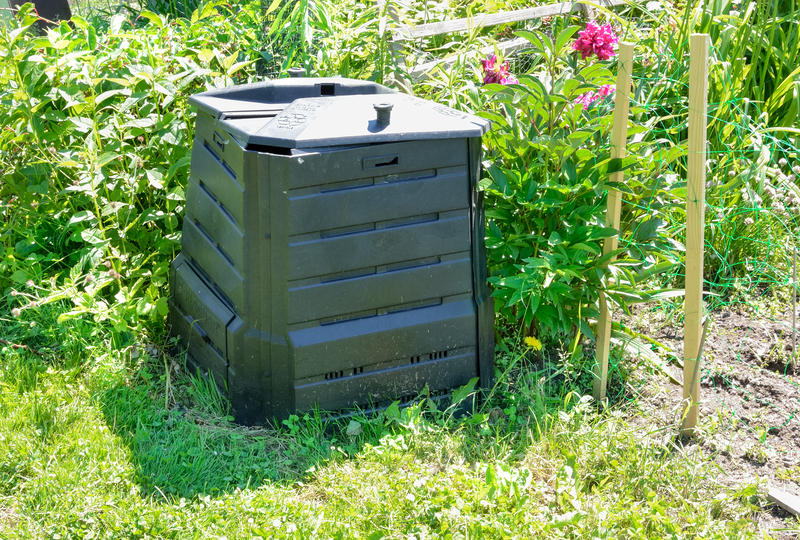Comprehensive Guide to Commercial Waste Management in Dalston
 Commercial waste management in Dalston is an essential service for businesses looking to maintain cleanliness and sustainability. Whether you run a small retail store, a large office, or an industrial facility, handling waste responsibly is crucial for both legal compliance and environmental stewardship. In this article, we delve into the various aspects of commercial waste in Dalston, providing you with the knowledge to manage it effectively.
Commercial waste management in Dalston is an essential service for businesses looking to maintain cleanliness and sustainability. Whether you run a small retail store, a large office, or an industrial facility, handling waste responsibly is crucial for both legal compliance and environmental stewardship. In this article, we delve into the various aspects of commercial waste in Dalston, providing you with the knowledge to manage it effectively.
Understanding the different types of commercial waste is the first step towards efficient waste management. Commercial waste can range from typical office waste like paper and cardboard to more specialized waste such as electronic equipment or hazardous materials. Each type requires specific handling and disposal methods to ensure safety and environmental protection.
 Effective waste management not only helps in reducing the environmental footprint of your business but also enhances your company's reputation. Clients and customers are increasingly conscious of sustainability practices, and demonstrating responsible waste management can give your business a competitive edge.
Effective waste management not only helps in reducing the environmental footprint of your business but also enhances your company's reputation. Clients and customers are increasingly conscious of sustainability practices, and demonstrating responsible waste management can give your business a competitive edge.
Types of Commercial Waste in Dalston
 Dalston businesses generate a variety of waste types, each with unique disposal requirements:
Dalston businesses generate a variety of waste types, each with unique disposal requirements:
- General Waste: Includes everyday items like paper, packaging, and non-recyclable materials.
- Recyclable Waste: Materials such as glass, metal, and certain plastics that can be processed and reused.
- Hazardous Waste: Items like chemicals, batteries, and electronic waste that require special handling.
- Organic Waste: Biodegradable waste from food services or landscaping activities.
Proper categorization of waste is essential to ensure that each type is handled appropriately, reducing the risk of contamination and promoting recycling and reuse.
Implementing a waste separation system within your business premises can significantly improve your waste management efficiency. By sorting waste at the source, you make it easier to recycle and dispose of materials correctly.
Benefits of Professional Waste Management Services
 Partnering with professional waste management providers in Dalston offers numerous advantages:
Partnering with professional waste management providers in Dalston offers numerous advantages:
- Compliance: Ensures your business adheres to local waste regulations and avoids potential fines.
- Efficiency: Streamlines waste disposal processes, saving time and resources.
- Sustainability: Facilitates recycling and responsible disposal, contributing to environmental conservation.
- Cost-Effectiveness: Optimizes waste management costs through tailored solutions.
Professional services often provide comprehensive waste audits to identify areas for improvement, helping your business implement more sustainable practices.
Investing in quality waste management services can lead to long-term savings and a more environmentally friendly operation.
Strategies for Effective Waste Reduction
 Reducing commercial waste is not only beneficial for the environment but can also lead to significant cost savings for your business. Here are some effective strategies:
Reducing commercial waste is not only beneficial for the environment but can also lead to significant cost savings for your business. Here are some effective strategies:
- Digital Transformation: Minimize paper usage by adopting digital solutions for documentation and communication.
- Inventory Management: Optimize inventory levels to reduce excess packaging and waste.
- Employee Training: Educate staff on proper waste segregation and reduction techniques.
- Recycling Programs: Implement comprehensive recycling initiatives tailored to your business needs.
Encouraging a culture of sustainability within your organization can lead to continuous improvements in waste management practices.
Regularly reviewing and updating your waste management policies ensures they remain effective and aligned with current regulations and best practices.
Choosing the Right Waste Management Partner in Dalston
 Selecting a reliable waste management partner is crucial for the success of your waste management strategy. Consider the following factors when choosing a provider:
Selecting a reliable waste management partner is crucial for the success of your waste management strategy. Consider the following factors when choosing a provider:
- Experience: Look for companies with a proven track record in handling commercial waste in Dalston.
- Services Offered: Ensure they provide the specific services your business requires, such as recycling, hazardous waste disposal, or regular waste collection.
- Compliance: Verify that the provider adheres to local and national waste management regulations.
- Customer Support: Choose a company that offers excellent customer service and support.
Engaging with a partner that understands the unique challenges of your industry can enhance the effectiveness of your waste management efforts.
Transparent pricing and clear communication are also key indicators of a trustworthy waste management service provider.
Environmental Impact of Commercial Waste
 The environmental implications of improper commercial waste disposal are significant. Landfills become overburdened, contributing to soil and water pollution, while the incineration of waste releases harmful emissions into the atmosphere.
The environmental implications of improper commercial waste disposal are significant. Landfills become overburdened, contributing to soil and water pollution, while the incineration of waste releases harmful emissions into the atmosphere.
- Resource Depletion: Excessive waste reduces the availability of raw materials needed for production.
- Energy Consumption: Producing new materials often requires more energy than recycling existing ones.
- Climate Change: Greenhouse gas emissions from waste contribute to global warming.
By implementing effective waste management practices, businesses can mitigate these environmental impacts, promoting a healthier and more sustainable community in Dalston.
Environmental stewardship not only benefits the planet but also aligns with the growing consumer demand for responsible business practices.
Legal Obligations for Waste Disposal
 Businesses in Dalston must comply with various waste disposal regulations to avoid legal consequences. Key legal obligations include:
Businesses in Dalston must comply with various waste disposal regulations to avoid legal consequences. Key legal obligations include:
- Waste Classification: Properly categorize waste according to local regulations.
- Licensing: Obtain necessary permits for waste transportation and disposal.
- Record-Keeping: Maintain accurate records of waste generation, disposal, and recycling activities.
- Reporting: Submit required reports to environmental authorities on waste management practices.
Non-compliance can result in hefty fines and damage to your business's reputation. Staying informed about current regulations and implementing compliant practices is essential.
Regular audits and assessments can help ensure ongoing compliance with waste management laws and standards.
Innovative Waste Management Solutions
 The field of waste management is evolving with new technologies and methodologies aimed at improving efficiency and sustainability. Some innovative solutions include:
The field of waste management is evolving with new technologies and methodologies aimed at improving efficiency and sustainability. Some innovative solutions include:
- Waste-to-Energy: Converting waste materials into usable energy through processes like incineration or anaerobic digestion.
- Smart Waste Bins: Utilizing sensors and IoT technology to monitor waste levels and optimize collection schedules.
- Circular Economy Models: Designing business processes that prioritize recycling, reuse, and reduction of waste.
- Biodegradable Packaging: Using eco-friendly materials that break down naturally, reducing long-term waste.
Adopting these advanced solutions can position your business at the forefront of sustainable practices, attracting environmentally conscious customers and partners.
Continuous investment in research and development is crucial for discovering new and more effective waste management techniques.
Community Impact and Corporate Responsibility
 Businesses play a vital role in the community's overall waste management ecosystem. Embracing corporate social responsibility (CSR) initiatives related to waste reduction can have positive ripple effects:
Businesses play a vital role in the community's overall waste management ecosystem. Embracing corporate social responsibility (CSR) initiatives related to waste reduction can have positive ripple effects:
- Community Engagement: Participate in local clean-up events and awareness campaigns.
- Educational Programs: Provide training and resources to educate staff and the community about sustainable waste practices.
- Partnerships: Collaborate with local organizations and authorities to enhance waste management infrastructure.
- Transparency: Share your waste management goals and progress with stakeholders to build trust and accountability.
By taking an active role in community waste management efforts, your business can contribute to a cleaner, healthier Dalston, while also strengthening its reputation and relationship with the local population.
Investing in CSR not only benefits the environment but also fosters a positive work environment and enhances employee morale.
Future Trends in Commercial Waste Management
 The landscape of commercial waste management is poised for significant transformation with emerging trends shaping the future:
The landscape of commercial waste management is poised for significant transformation with emerging trends shaping the future:
- Automation and AI: Leveraging artificial intelligence to optimize waste sorting and processing.
- Zero Waste Initiatives: Striving to eliminate waste by redesigning production processes and adopting sustainable materials.
- Extended Producer Responsibility: Holding manufacturers accountable for the entire lifecycle of their products, including disposal.
- Blockchain Technology: Enhancing transparency and traceability in waste management operations.
Staying abreast of these trends can help your business adapt to changing regulations and consumer expectations, ensuring long-term success and sustainability.
Proactively integrating new technologies and practices can provide a competitive advantage in the evolving market.
Conclusion
 Managing commercial waste in Dalston requires a strategic approach that encompasses understanding waste types, complying with regulations, and adopting sustainable practices. By partnering with professional waste management services, implementing effective reduction strategies, and staying informed about future trends, your business can achieve both environmental and economic benefits.
Managing commercial waste in Dalston requires a strategic approach that encompasses understanding waste types, complying with regulations, and adopting sustainable practices. By partnering with professional waste management services, implementing effective reduction strategies, and staying informed about future trends, your business can achieve both environmental and economic benefits.
Take the initiative today to enhance your waste management practices, contribute to a cleaner Dalston, and position your business as a leader in sustainability.








